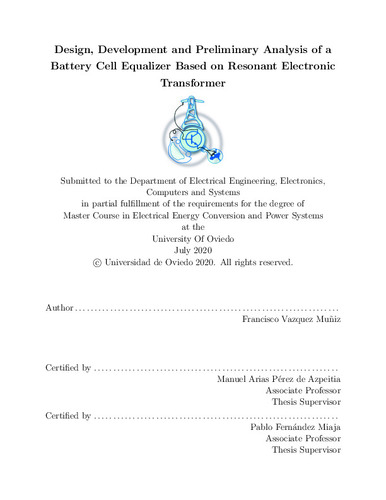Design, Development and Preliminary Analysis of a Battery Cell Equalizer Based on Resonant Electronic Transformer
Otros títulos:
Diseño y desarrollo de un prototipo de ecualizador de baterías basado en la topología denominada Transformador Electrónico Resonante
Autor(es) y otros:
Director(es):
Palabra(s) clave:
Cell Equalizer
Electronic Transformer
Resonant Converter
Zero Current Switching
Tolerances Effect
Fecha de publicación:
Serie:
Máster Universitario en Conversión de Energía Eléctrica y Sistemas de Potencia
Descripción física:
Resumen:
This work consists on the research and analysis of a modular Electronic Transformer (ET) suitable for working in a battery equalizer. The ET will consist on an resonant isolated converter where the resonant inductance is integrated in the transformer. A simulation of the system will first show how with a basic control of the input bridge, the equalizer works, but no zero current switching (ZCS) is achieved, thus, efficiency is low. Methods to reduce the peak current of the ET will be also shown. A specific gate control topology will be proposed in this work. The resulting modulated topology provides high efficiency through soft switching, being valid for simple battery cell equailizer as it does not require either a central control or feedback loops. The effect of tolerances in the performance of the system will be finally assessed.
This work consists on the research and analysis of a modular Electronic Transformer (ET) suitable for working in a battery equalizer. The ET will consist on an resonant isolated converter where the resonant inductance is integrated in the transformer. A simulation of the system will first show how with a basic control of the input bridge, the equalizer works, but no zero current switching (ZCS) is achieved, thus, efficiency is low. Methods to reduce the peak current of the ET will be also shown. A specific gate control topology will be proposed in this work. The resulting modulated topology provides high efficiency through soft switching, being valid for simple battery cell equailizer as it does not require either a central control or feedback loops. The effect of tolerances in the performance of the system will be finally assessed.
Colecciones
- Trabajos Fin de Máster [5283]
Ficheros en el ítem





